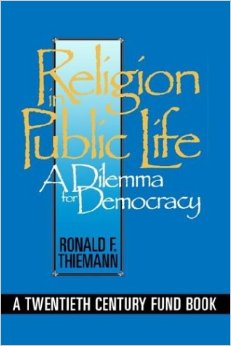 (Reprinted with permission from The Christian Century, written by Martin E. Marty.)
(Reprinted with permission from The Christian Century, written by Martin E. Marty.)
Add to the list of titles on religion and public life this entry by Harvard Divinity Dean Ronald Thiemann: Religion in Public Life: A Dilemma for Democracy. He is not the phrasemaker that some other authors are, so his drably titled book may have a hard time making its way into the cultural debate. But those who read it will be rewarded by rich reasoning and daring proposals.
“I want to argue that the politics of the particular are not necessarily a threat to the historic sense of a national identity,” Thiemann states. Indeed, they are, or can be, assets.
The author leaves himself some work for a future volume: the question of how a republic or democracy can move forward when fanatic voices will not let their equally fanatic antagonists be heard or respected. Thiemann too easily suggests that the dilemma can be resolved if liberal theorists allow for and respect a certain kind of religious voice in the public conversation, and if that voice speaks up respectfully but vigorously. He glosses over the difficulty the majority face, but cannot, because it is outshouted by spokespersons for mutually exclusive groups that disdain and refuse to hear each other.
The problem is not only with the liberal theorists who have excluded religious voices but with the religious partisans on the left and right alike who do not embody, exemplify or allow for “mutual respect.” Thiemann successfully refutes their positions and elegantly reaffirms the common democratic heritage their actions negate. But these disrespectful religious partisans continue to discourage the respectful ones from speaking up or staying on the scene. How can we arrive at a cease-fire that will allow the militants to hear and respect those with whom they violently disagree? More important, how can we give voice, courage, and motivation to the moderate majority?
If Thiemann’s answer to that question is stated too modestly, almost naively, he nevertheless might give us a language and a spirit for the project. He states the dilemma clearly. His discussion of previous liberal theorists who have treated religion as a problem in a republic is cautious, fair, and patient. He is respectfully aware that many religionists prefer sectarian purity to republican engagement, but he is discontented with the positions of both theorists and sectarians, and offers alternatives.
Like most public theologians, he does not find the Jeffersonian metaphor of the “wall of separation between church and state” accurate or satisfying. He finds Supreme Court decisions based on that metaphor inconsistent at best and unfair to the American tradition and ethos at worst.
Turning away from Jefferson, Thiemann finds an “illuminating suggestion” in the work of James Madison. As Thiemann reminds us: “For Madison, the fundamental values of democratic government are derived from his defense of the free exercise of religion; even more striking is the fact that the argument through which he discerns these core values is explicitly theological.” We Madisonians have to build on Madison’s illuminating suggestion to a greater degree than Thiemann has so far, but his third way is surely a signal of hope for future conversation and argument.